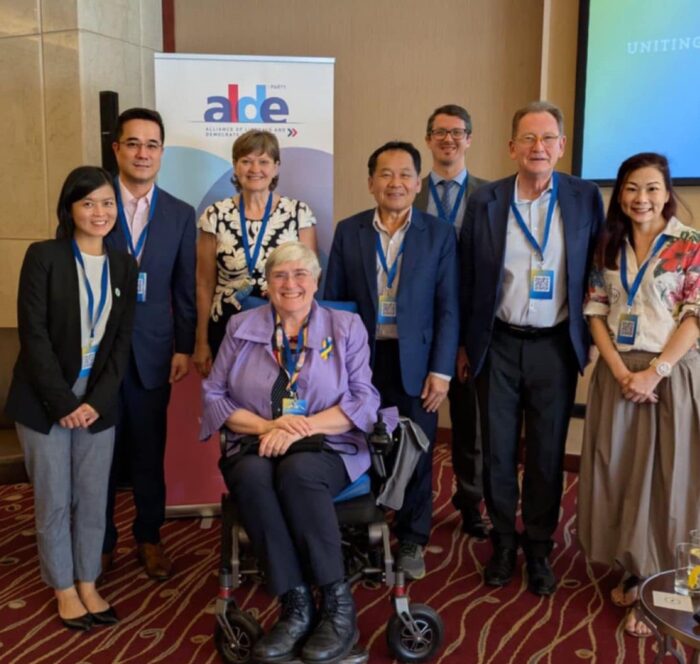
It was the first event of its kind in Latin America, and it took place at a time when global freedom is under severe threat. The 64th Congress of Liberal International (LI) took place in Santiago, Chile on 29 November – 1 December 2024 with the theme, “The Future of Freedom: Uniting Liberals to Re-Empower Democracies.” Then LI President Hakima el Haite recognized that the Congress convened “at a time of significant global uncertainty, where the tenets of liberalism we hold dear face unprecedented challenges.” She, however, remains a strong believer of the indomitable spirit of the global liberal family. She said: “Across continents, courageous individuals continue to fight for their nations, rights, and lives, reminding us of the profound impact our collective efforts can have.” A delegation from the Council of Asian Liberals and Democrats (CALD) participated actively in the Congress, and also co-organized with the Alliance of Liberals and Democrats for Europe (ALDE) Party a side-event on the possible shape of US foreign policy under the second Trump administration. CALD Chairperson Mardi Seng led the delegation, which also included CALD Secretary General Francis Abaya, CALD Women’s Caucus Chairperson Jaslyn Go, and representatives from member-parties in Taiwan and Mongolia. One of the plenary panels in the Congress was on “AI, Liberal Democracies and Governance: Shaping the Future of Elections and Public Trust.” CALD Chairperson Seng spoke in the panel, where he shared key insights from CALD’s policy paper on AI. He noted: “As a network of liberal and democratic political parties, we acknowledged that AI can be a double-edged sword. On the one hand, it can be used to propagate disinformation during the campaign, especially through the use of deep fakes. On the other hand, there is also immense potential for AI to enhance electoral transparency, voter engagement and campaign efficiency.” Representatives from Democratic Progressive Party (DPP) of Taiwan also took part on multiple panels – including Legislator Fan Yun who spoke in the panel, “Democracies Under Pressure: Confronting the Axis of Autocrats.” DPP’s Deputy Director for International Affairs Wenli Alysa Chiu also presented in a roundtable discussion on transnational repression. The highlight of the Congress for CALD, however, was its joint session with the ALDE Party. With the theme, “US Foreign Policy under Trump 2.0: Implications for Asia and Europe”, the session’s objectives were two-fold: (1) to analyze the possible shape of US foreign policy in the incoming Trump presidency and its implications for regional security and the global liberal order; and (2) to share experiences and strategies on how to protect and reinforce the global liberal order against authoritarian intrusions. “Trump’s second term would be characterized by heightened superpower competition with China, decline of multilateralism and a less open global economy”, argued CALD Chairperson Seng. “Trump has made our work more difficult, but we must remember that the liberal and democratic values which made the world more secure and more prosperous in the past decades are much stronger and enduring than a thousand Trumps”, he added. Apart from Seng, the other speakers in the session moderated by ALDE Party Vice President Eva Kjer Hansen included: Ukrainian Member of Parliament Vadym Halaichuk, Baronness Sal Brinton of the UK Liberal Democrats and Chiu from DPP Taiwan. Sir Graham Watson, who played a very significant role in the initial convening of the ALDE-CALD Meeting in 2002, delivered the session’s closing keynote address. The 64th LI Congress also inaugurated a new LI Bureau. See here CALD’s congratulatory letter to the newly elected LI President Karl-Heinz Paque. |
Categorised in: News Article
This post was written by CALD
 Unit 409, 4/F La Fuerza Plaza 2, 2241 Don Chino Roces Ave. corner Sabio St., 1231 Makati City, Philippines
Unit 409, 4/F La Fuerza Plaza 2, 2241 Don Chino Roces Ave. corner Sabio St., 1231 Makati City, Philippines
 +632 8819 60 71
+632 8819 60 71
 info@cald.org
info@cald.org